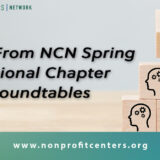Is there such thing as a wrong time to invest in spatial justice?
The swirl of opinions about the pandemic’s impact on the state of commercial real estate and how that intersects with the outlook on nonprofit centers continues. Some reports are that workers are already back in their offices at near pre-pandemic levels and have been for the better part of a year, at least in small and mid-sized cities. Another report out of San Francisco recently warned that the city’s status as a commercial real estate investor’s dream hasn’t yet found its post-COVID footing as office buildings are pulled off the market after fetching lower than expected bids. From NCN’s perspective, some NCN members report lingering vacancies, but our consulting pipeline is currently full of groups creating new nonprofit centers in their communities. But I’m left to wonder: what if the conversation about nonprofit centers and social purpose real estate more broadly shouldn’t be about what’s happening in the speculative real estate market or corporate workspace world at all? What if talking about the “right time” to invest in community-controlled community infrastructure is missing the point altogether?
Every building we spend time in for our jobs (and a reminder that regardless of what stage of pandemic rebound we’re in, we are still spending our time in buildings), whether it be meeting spaces, office buildings, cafes, are owned and governed by someone. And that someone, whether it’s a person or an institution, determines the design, sets the values, and governs the users in ways that either perpetuate traditional power structures (namely well-resourced, white, male, and heteronormative, to name a few) or not. Accordingly, if the buildings in which we are connecting with colleagues, completing heads-down worktime, or meeting with clients are designed, owned, and managed by people or institutions that do not consider the common good or incorporate values of equity and justice, then we are missing an opportunity for these spaces to be a part of our long collective march toward social, economic, and racial justice. Makani Themba of The Praxis Project sees this very clearly: “Space is a place of intersecting struggles/oppression/opportunities; how we move or not move through it, adapt to it, monitor it, buy or borrow it, claim or cut it off shapes everything we do and big parts of who we are.” So, in the same way our organizations (hopefully) did not look to market bellwethers to determine whether it was the “right time” to invest in cultures that embrace JEDI practices or in staff retirement accounts that integrate ESG factors, I’d encourage the same approach to investing in spatial justice (to read more about this, head here). Even if social purpose real estate projects now require a level of creativity or flexibility around use, purpose, or partnerships that were not necessary before March 2020, our buildings, and who runs them and how, have always and continue to really matter.
Are you an NCN member?
Be sure to check your calendar invitation from us for the next roundtable to hear some tips firsthand. Want to be part of your Regional Chapter, but aren’t an NCN member yet? Fill out this form to learn more about your Regional Chapter and membership.






